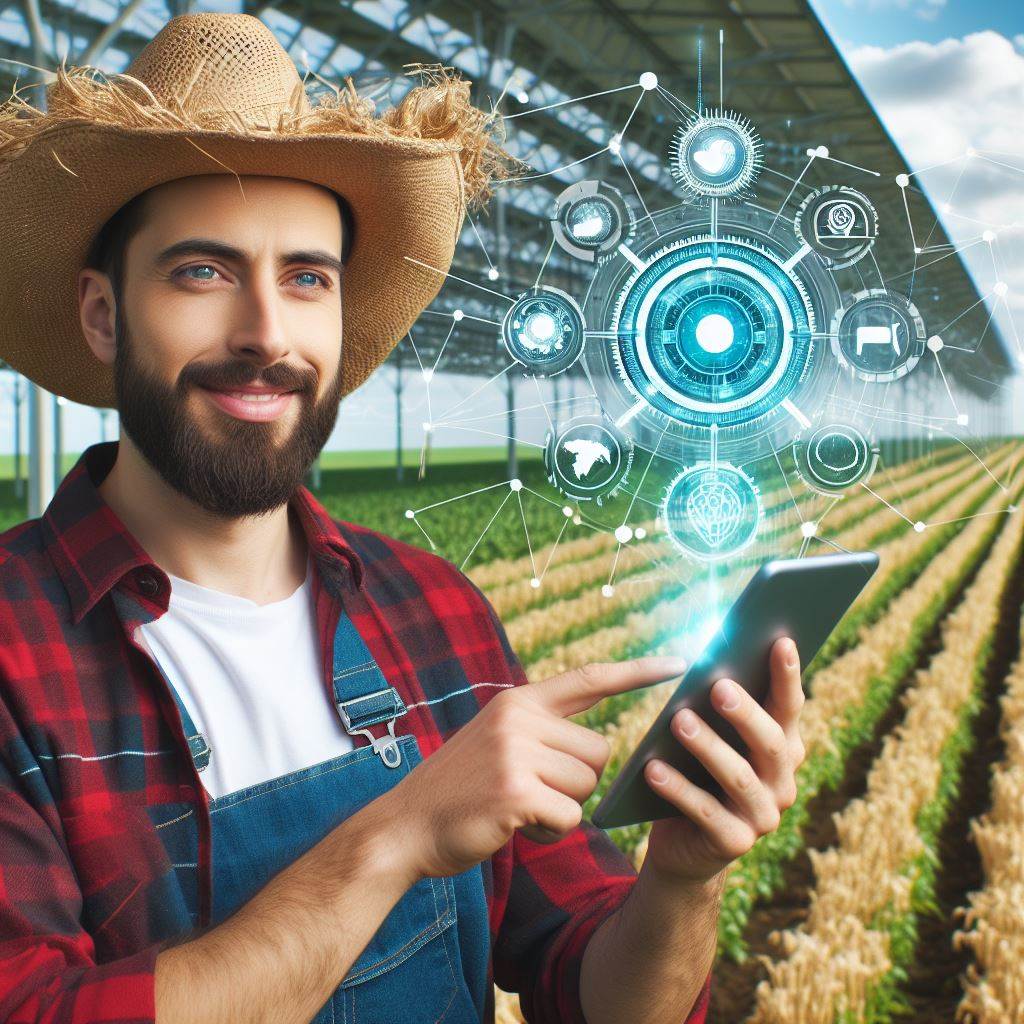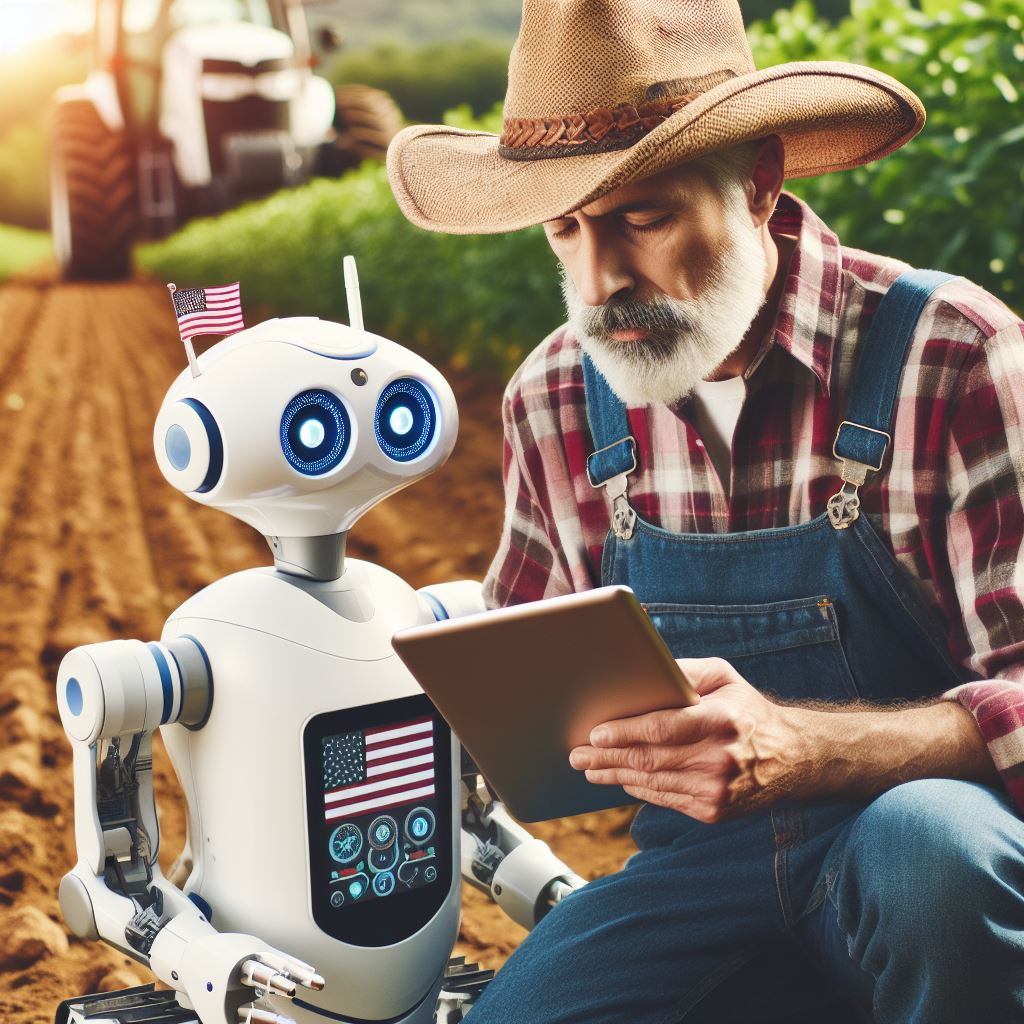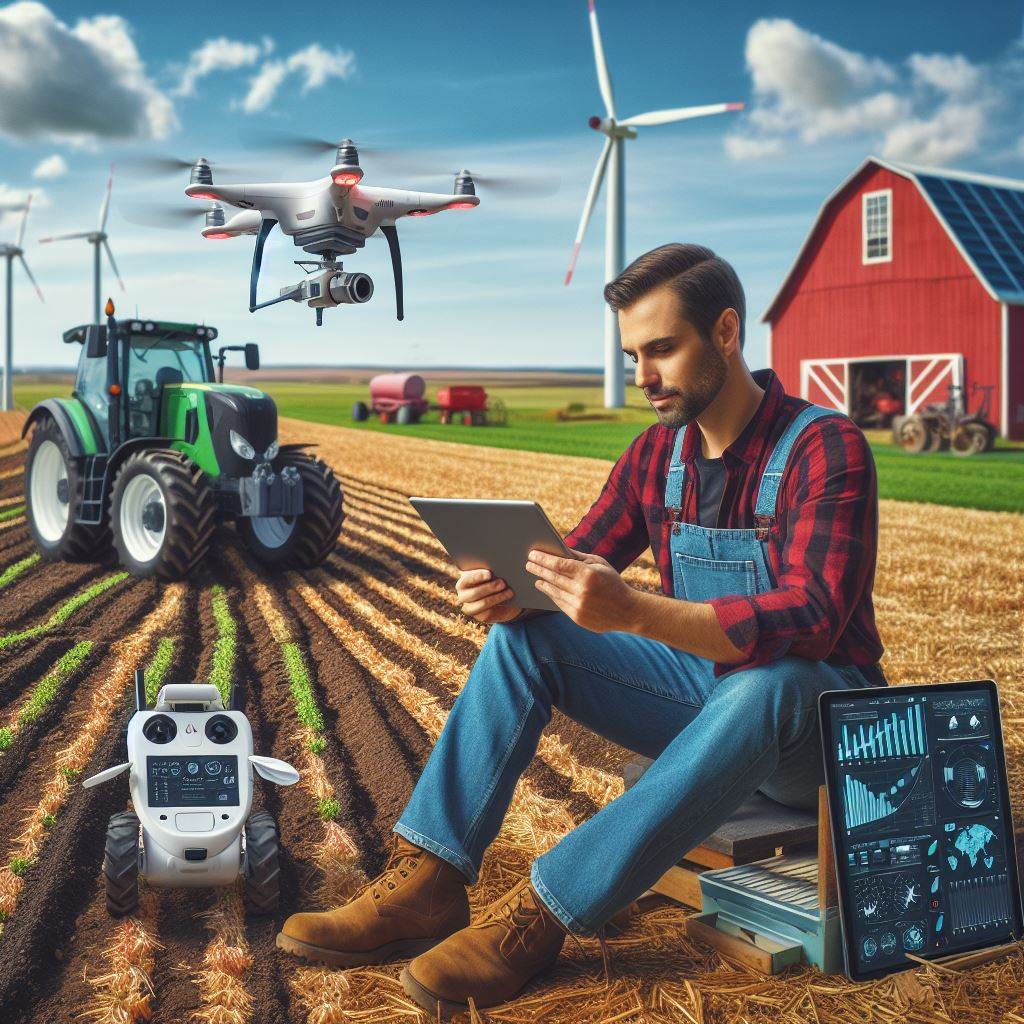Introduction
Importance of agriculture and the need for increasing crop yields
Agriculture plays a crucial role in feeding the growing global population and ensuring food security.
With the world’s population estimated to reach 10 billion by 2050, there is an urgent need to increase crop yields to meet the demand.
This is where the potential of artificial intelligence (AI) comes into play, as it has the capability to revolutionize the farming industry.
The potential of AI in revolutionizing the farming industry
AI has the ability to optimize various farming processes, leading to improved efficiency and higher yields.
By analyzing vast amounts of data, AI algorithms can provide valuable insights into weather patterns, soil conditions, and crop growth.
This knowledge allows farmers to make data-driven decisions and implement precision agriculture techniques.
Monitor crops in real-time
One of the main advantages of AI in farming is its ability to monitor crops in real-time.
Smart sensors and drones equipped with AI technology can capture data on plant health, nutrient levels, and pest infestations.
This data can then be used to identify and address issues before they escalate.
By identifying areas that need attention, farmers can minimize crop loss and maximize production.
Reduces the manual labor required and increases productivity
AI-powered robots are also making their way into the agricultural sector.
These robots can perform tasks such as planting seeds, harvesting crops, and even removing weeds with precision and efficiency.
This reduces the manual labor required and increases productivity.
Optimize resource management
Additionally, AI can optimize resource management by precisely managing water, fertilizer, and pesticide usage.
By analyzing data on soil moisture levels and weather conditions, AI systems can determine the exact amount of resources needed, reducing waste and environmental impact.
Transform Your Agribusiness
Unlock your farm's potential with expert advice tailored to your needs. Get actionable steps that drive real results.
Get StartedBasically, AI has immense potential to transform the farming industry by boosting yields and ensuring sustainable agriculture practices.
By harnessing the power of AI, farmers can make informed decisions, optimize resources, and ultimately increase crop yields to meet the growing demands of a hungry world.
Understanding AI in Farming
AI and its applications in various industries
AI, or Artificial Intelligence, is a technology that enables machines to imitate human intelligence.
From healthcare to finance, AI has found applications in various industries.
In recent years, AI has also started making its way into agriculture, revolutionizing the way farming is done.
By harnessing the power of AI, farmers can significantly enhance productivity and efficiency on their farms.
How AI can be applied in farming to enhance productivity and efficiency
So, how exactly can AI be applied in farming to achieve these benefits?
Here are some ways:
Precision Farming
AI can enable farmers to adopt a precision approach to farming.
By utilizing advanced sensors and machine learning algorithms, AI systems can gather real-time data on soil moisture levels, nutrient content, and other variables.
This data is then used to generate precise recommendations for irrigation, fertilizer application, and pest control, optimizing resource utilization and crop yields.
Crop Monitoring and Disease Detection
AI-powered drones equipped with high-resolution cameras can be used to monitor crops.
These drones analyze images and videos to identify and detect diseases, pests, nutrient deficiencies, and other issues.
This early detection allows farmers to take immediate action, preventing the spread of diseases and minimizing crop losses.
Weather Forecasting
AI algorithms can analyze large volumes of historical weather data and make accurate predictions for future weather patterns.
This information is crucial for farmers as it helps them plan their activities accordingly.
By knowing when to expect rainfall, farmers can optimize irrigation scheduling, prevent overwatering, and reduce water waste.
Autonomous Farming Equipment
AI can enable the development of autonomous farming machines, such as robotic harvesters and weeders.
These machines use computer vision and AI algorithms to navigate through fields, identify crops, and perform tasks like harvesting or removing weeds.
By automating these labor-intensive tasks, farmers can save time and resources, ultimately boosting overall productivity.
Predictive Analytics
AI can analyze vast amounts of historical and real-time data to generate insights and predictions.
By analyzing weather patterns, crop growth data, market trends, and other factors, AI can provide farmers with valuable information about the best time to plant, harvest, and sell crops.
This helps farmers make data-driven decisions and maximize profitability.
Livestock Monitoring and Management
AI can also be applied to livestock farming.
Showcase Your Farming Business
Publish your professional farming services profile on our blog for a one-time fee of $200 and reach a dedicated audience of farmers and agribusiness owners.
Publish Your ProfileSensors and wearable devices can gather data on animal health, behavior, and well-being.
AI algorithms can then analyze this data to detect early signs of illness, optimize feeding schedules, and improve overall animal welfare.
This technology ensures that farmers can provide the best care for their livestock, leading to increased productivity and profitability.
Supply Chain Optimization
AI can assist farmers in managing their supply chains more efficiently.
By using AI algorithms to analyze demand, inventory levels, transportation costs, and other factors, farmers can optimize their logistics and reduce waste.
This ensures that crops and produce reach the market on time, minimizing spoilage and maximizing profitability.
Essentially, AI has tremendous potential to transform farming by enhancing productivity and efficiency.
By harnessing the power of AI, farmers can adopt precision farming techniques, monitor crops effectively, optimize resource utilization, and make data-driven decisions.
Whether it’s crop monitoring, weather forecasting, or livestock management, AI is proving to be a game-changer in the agricultural industry.
Embracing AI in farming is vital for boosting yields smartly and ensuring sustainable food production for a growing population.
Read: Future of Farming: AI and Machine Learning in Agri-Tech
Benefits of AI in Farming
In recent years, the integration of artificial intelligence (AI) in various industries has proven to be highly beneficial.
One such sector that can greatly benefit from AI is farming.
With the implementation of AI-driven technology, farmers can significantly boost yields and improve their overall efficiency.
Let’s delve into the various advantages of AI in farming:
Effective Monitoring and Data Analysis
AI can help farmers monitor and analyze data more effectively.
Through the use of advanced sensors and imaging technologies, AI systems can collect and process data related to soil quality, crop growth, weather patterns, and more.
This allows farmers to make informed decisions and take appropriate actions based on real-time information.
Optimal Resource Allocation and Waste Reduction
AI-driven technology can optimize resource allocation in farming practices.
By analyzing data related to soil composition, nutrient requirements, and weather conditions, AI systems can provide farmers with precise recommendations on fertilizer and water usage.
This minimizes unnecessary resource wastage, optimizes crop health, and reduces overall production costs.
Enhanced Disease and Pest Management
AI possesses the ability to predict crop diseases and pests accurately.
By analyzing historical data and current environmental conditions, AI algorithms can identify early signs of diseases or infestations.
This enables farmers to take swift preventive measures and implement targeted treatments, leading to better disease management and preserving crop yields.
Precision Agriculture
AI technology plays a crucial role in precision agriculture.
By utilizing AI, farmers can achieve improved precision in various agricultural practices like irrigation, fertilization, and weed control.
AI-powered systems can analyze data from multiple sources, including satellite imagery and soil sensors, to provide farmers with precise recommendations on when and where to apply resources.
This reduces wastage and ensures the optimal use of inputs, resulting in higher crop productivity.
Increased Automation and Efficiency
AI in farming enables automation of routine tasks, saving farmers time and effort.
AI-powered machines can perform labor-intensive activities such as planting, harvesting, and sorting crops with precision and speed.
This not only increases overall efficiency but also reduces labor costs. Farmers can focus on more strategic activities, such as crop planning and management.
Improved Crop Quality and Sustainability
AI can contribute to the improvement of crop quality and sustainability.
By continuously monitoring and analyzing crop conditions, AI systems can identify factors that affect crop quality, such as nutrient deficiencies or disease outbreaks.
This knowledge allows farmers to take appropriate measures to ensure high-quality produce and reduce environmental impacts from excessive use of fertilizers or pesticides.
Enhanced Decision-making
AI can assist farmers in making better decisions.
By providing accurate and timely insights derived from vast amounts of data, AI systems can support farmers in making informed choices regarding planting schedules, crop selection, and market demand.
This reduces risks and increases profitability in farming operations.
In general, AI holds immense potential in revolutionizing farming practices.
The benefits of AI in agriculture include effective monitoring and data analysis, optimal resource allocation, disease and pest prediction, precision agriculture, increased automation, improved crop quality, sustainability, and enhanced decision-making.
As the agricultural industry faces the challenge of feeding a growing population, harnessing the power of AI in farming will play a vital role in boosting yields smartly and ensuring sustainable food production for the future.
Showcase Your Farming Business
Publish your professional farming services profile on our blog for a one-time fee of $200 and reach a dedicated audience of farmers and agribusiness owners.
Publish Your ProfileRead: Sustainable Farming: How Agri-Tech is Helping
Challenges and Concerns
Potential Challenges
- Compatibility issues between existing farming systems and AI technology may arise.
- Integration of AI tools requires financial investments, posing challenges for small-scale farmers.
- Data privacy and security concerns may discourage farmers from adopting AI technology.
- Machine learning algorithms require large amounts of data, which may be lacking in some regions.
- Ensuring reliable internet connectivity in rural areas is crucial for effective AI implementation.
Skepticism and Fear Surrounding AI’s Impact
- Farmers often hesitate to rely on AI as it may displace manual labor, leading to unemployment.
- Concerns about AI’s performance and ability to make accurate decisions hinder its widespread adoption.
- Farmers worry that AI may reduce their autonomy and decision-making power in agricultural practices.
- Unfamiliarity with AI technology leads to skepticism and resistance to change among traditional farmers.
- Fear of increased dependence on technology and the potential for system failures deters some farmers.
The Need for Proper Training and Education
- Effective training programs are essential to familiarize farmers with AI technologies and their benefits.
- Education on data collection, management, and analysis is crucial for successful AI integration in farming.
- Providing farmers with the necessary skills to operate and maintain AI systems is vital.
- Government initiatives should focus on promoting educational resources for farmers to upskill in AI technologies.
- Collaboration between agricultural universities, research institutions, and farmers can facilitate knowledge exchange.
While AI holds tremendous potential for revolutionizing farming practices and boosting yields, it is essential to address the challenges and concerns associated with its implementation.
Compatibility issues, financial limitations, data privacy, and connectivity issues must be resolved to ensure widespread adoption.
Overcoming skepticism and fear through education and training programs is crucial.
By empowering farmers with the necessary skills and knowledge, they can successfully integrate AI into their farming operations, resulting in increased productivity, efficiency, and sustainability.
Read: Sustainable Tools: Tech in Organic Agriculture

Find Out More: Crop Monitoring AI: Precision Farming Tech
Real-world Examples
AI technologies are revolutionizing the farming industry, leading to higher crop yields and increased farm productivity.
Let’s explore some successful cases where AI has been effectively implemented:
Successful cases where AI has been effectively implemented
- Harvesting Robots: AI-powered robots are being employed to harvest crops such as lettuce. These robots use computer vision to identify ripe vegetables and pick them accurately and efficiently.
- Precision Agriculture: AI systems analyze data gathered from sensors, drones, and satellites to optimize irrigation, fertilizer use, and pest control. This technology ensures that crops receive the right treatment at the right time, minimizing waste and maximizing yield.
- Disease Detection: AI algorithms can detect plant diseases early by analyzing images of leaves taken by drones or smartphones. This enables farmers to take immediate action, preventing the spread and minimizing losses.
- Weed Identification: AI image recognition technology can differentiate between crop plants and invasive weeds accurately. This allows for targeted weed control, reducing the reliance on herbicides and increasing crop productivity.
- Automated Monitoring: AI-powered cameras and sensors continuously monitor crop health, temperature, and humidity. This real-time data helps farmers identify and address issues promptly, ensuring optimal growing conditions and higher yields.
- Livestock Monitoring: AI systems equipped with computer vision enable farmers to remotely monitor the health and behavior of their livestock. This technology can detect early signs of disease, reduce labor, and improve overall animal welfare.
Additional Successful Real life Examples
- Predictive Analytics: AI algorithms analyze historical and real-time data to predict yield, market prices, and optimal planting times. This assists farmers in making informed decisions and maximizing their profits.
- Crop Quality Sorting: AI-driven sorting machines can inspect harvested produce and sort them based on size, shape, color, and quality. This helps reduce post-harvest losses and ensures consistent product quality.
- Autonomous Machinery: AI-powered autonomous vehicles and machinery can carry out labor-intensive tasks such as plowing, spraying, and harvesting without human intervention. This saves time, labor costs, and increases overall efficiency.
- Smart Irrigation: AI-based irrigation systems analyze soil moisture levels, weather forecasts, and plant water requirements to deliver precise amounts of water where and when needed. This conserves water resources and optimizes crop growth.
These real-world examples demonstrate the immense potential of AI in revolutionizing the farming industry.
By leveraging AI technologies, farmers can significantly boost crop yields, minimize resource wastage, and enhance overall farm productivity.
In essence, AI is not just a buzzword in farming; it is a game-changer.
The integration of AI systems in agriculture offers exciting prospects for sustainable, efficient, and profitable farming.
As technology continues to evolve, we can expect even greater advancements in AI applications for the betterment of the farming community and global food security.
Read: Sustainable Ag Tech: What’s New?
Future Outlook
As AI continues to advance at an unprecedented pace, the potential for its impact on farming is immense.
Here, we discuss the potential of AI in shaping the future of farming, mentioning advancements in AI technology that can further revolutionize agriculture and highlighting the need for continuous research and development in AI for sustainable farming practices.
The potential of AI in Shaping the Future of Farming
- Increased Efficiency: With AI-powered farming systems, farmers can optimize operations and increase efficiency.
- Precision Agriculture: AI enables precision agriculture, where farmers can monitor and manage crops at an individual level.
- Enhanced Decision-Making: AI algorithms can analyze a vast amount of data to provide valuable insights for better decision-making.
- Reduced Environmental Impact: AI can help minimize the use of water, pesticides, and fertilizers, reducing the environmental impact of farming.
- Improved Crop Health: By analyzing data and identifying patterns, AI can detect crop diseases and optimize treatments.
Advancements in AI Technology for Agriculture
- Machine Learning: AI algorithms can learn from data to make predictions and provide recommendations for farmers.
- Computer Vision: AI-powered computer vision systems can analyze images to detect plant diseases and monitor crop health.
- Robotics and Automation: AI-enabled robots can perform tasks such as seeding, harvesting, and spraying with precision and efficiency.
- Sensor Technology: AI can integrate data from various sensors to monitor soil moisture levels, weather conditions, and crop growth.
- Data Analytics: AI can analyze data from multiple sources, such as weather patterns and crop yield history, to predict optimal farming practices.
Continuous Research and Development in AI for Sustainable Farming Practices
- Adapting to Climate Change: With AI, farmers can develop resilient crop varieties that can withstand changing climatic conditions.
- Maximizing Resource Efficiency: AI algorithms can help farmers optimize the use of resources like water and energy.
- Improving Food Safety: AI can enhance food safety by detecting contaminants and ensuring quality throughout the supply chain.
- Empowering Small-Scale Farmers: AI can bring advanced farming techniques and knowledge to small-scale farmers, increasing their productivity and income.
- Collaborative Efforts: Governments, agricultural organizations, and tech companies should collaborate to support AI research for sustainable farming practices.
In a nutshell, AI has the potential to revolutionize agriculture by increasing efficiency, enabling precision agriculture, and improving decision-making.
Advancements in AI technology, such as machine learning, computer vision, robotics, and sensor technology, further amplify its impact.
However, continuous research and development are essential to ensure sustainable farming practices and address challenges posed by climate change.
The future of farming lies in embracing and harnessing the potential of AI for a more productive, efficient, and environmentally friendly agricultural sector.
Learn More: Regenerative Agriculture: Tech Approaches
Conclusion
Key points discussed in the blog post
AI technology has immense potential in boosting yields and transforming farming practices.
By analyzing data and providing valuable insights, AI can help farmers make informed decisions and optimize their operations.
With AI, farmers can detect diseases and pests early, monitor crop health, and optimize irrigation and fertilizer usage.
This not only increases productivity but also reduces costs and minimizes the environmental impact.
Moreover, AI can also enhance precision agriculture by enabling drones and robots to perform various tasks efficiently, such as planting, harvesting, and monitoring the fields.
The potential of AI in boosting yields and transforming farming practices
By embracing AI, farmers can revolutionize the agriculture industry by achieving higher yields, reducing waste, and ensuring the sustainability of their operations.
With the help of AI, farming can become more efficient, precise, and profitable. It can unlock untapped potential in farming practices and address food security challenges globally.
Encouragement for farmers to embrace AI technology for better productivity and sustainability in agriculture
Therefore, it is crucial for farmers to embrace AI technology and explore its capabilities to achieve better productivity and sustainability in agriculture.
By investing in AI-powered solutions and collaborating with technology providers, farmers can enhance their decision-making processes, improve crop quality, and contribute towards a more efficient and sustainable agricultural sector.
With AI, the future of farming is bright, and it holds tremendous promise in ensuring food security for a growing global population.




